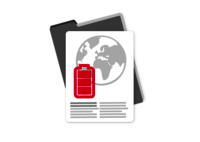The cnet.com portal reports on a current case of product piracy against which the marketplace operator Amazon and a well-known barbecue manufacturer are currently taking action. For instance, fake grill covers of the well-known brand are being offered by a third-party vendor and not by the manufacturer itself.
However, neither company knows the true identity of the sellers. The sellers are located at business addresses in China that were provided by the illegally operating sellers when they signed up with Amazon.
Accordingly, online marketplaces are being criticised for enabling product pirates to engage in illegal trade in counterfeit products. Some platforms have even gained particular notoriety for selling e.g. branded electronics at bargain prices. An information sheet provided by the German police union warns against such supposed bargains: “Branded products at extra low prices are most probably counterfeit articles.”
Compliant labelling distinguishes quality products from fakes
As the quality of workmanship and functionality can only be verified by the purchaser once the product has been delivered, product labelling plays a special role in distinguishing between genuine and counterfeit products in online retailing. In a nutshell: the quality and conformity of the labelling distinguishes products from supposedly “cheap” or even counterfeit articles.
The police union also recommends consumers to look out for “spelling mistakes or nonsensical sentence structures in product and warranty information”. The Süddeutsche Zeitung already reported in 2018 that consumers in the EU are familiar with the CE mark and are entitled to expect that the product complies with the relevant health and safety requirements:
“False CE marks can be recognised by the fact that the two letters are too close together, the middle stroke protrudes too far from the E and is right-justified. The real ‘CE mark’ is matched, and if the ‘C’ is represented as a circle, then it overlaps with the ‘E’.” The article also recommends the following: “In addition to the CE mark, the company name and address of the manufacturer must be listed. If this is not the case, you might as well send it back straight away to the retailer. Better: The consumer really should not buy it in the first place.”
This means that legally compliant product labelling certainly is a hallmark of original merchandise. Various consumer contact points generally advise against the purchase of products lacking compliant labelling.
If you have any questions on the subject of product labelling, our team of consultants will be delighted to assist you. Please call +49/40/75068730-0 or send an e-mail message to sales@trade-e-bility.de.
Tip: Webinar on labelling regulations for non-food products in the EU
The free live webinar deals e.g. with the labelling of packaging material (focusing on France, Italy, Green Dot and other labels), energy labels, WEEE, batteries, product safety, toys, CLP, labels derived from standards. In order to be able to present the topics to our domestic and international customers, the webinar will be held in English. Accordingly, please feel free to recommend it to your foreign partners as well. The webinar is scheduled to be held on Tuesday, 30 November 2021, starting at 09:00h (CET).

